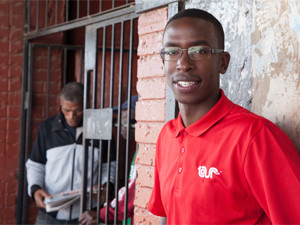
Fledgling Tshwane company Tour 2.0 aims to shatter stereotypes about South Africa. The company has created an online platform that promotes a variety of South African communities and encourages international tourists to come and meet their residents. "We want to use technology to enable people from around the world to experience real African stories," says Tour 2.0 CEO Daniel Adidwa. Tour 2.0 strives to give tourists a perspective of South Africa that goes beyond common international perceptions of the country that frequently highlight crime, poverty and corruption. "We offer tourists the opportunity to hear the real stories of South Africa and experience the generosity, hospitality and resourcefulness of its people," says Adidwa.
Since its launch in April, Tour 2.0 has organised visits for more than 100 tourists from Germany, Sweden and the UK to communities around Johannesburg and in Refilwe near Cullinan. Tour 2.0 offers tourists a diverse range of community experiences such as bird watching in the wetlands of Soweto, cycling trips around Alexandra, culinary tours of Yeoville, insights into the political history of Ferreirasdorp and Soweto and a crash course in hip-hop in Newtown. "We started with three destinations - Soweto, Alexandra and Refilwe - and by August, we'll be up to 15," says Adidwa. Tour 2.0 is concentrating on Gauteng but plans to expand into KwaZulu-Natal and the Western Cape next year and then move into other regions around the country.
Social media
The company, currently part of the mLab start-up accelerator programme, uses social media platforms such as Facebook, Twitter and Pinterest, as well as an interactive website to promote its business. The Tour 2.0 website enables prospective clients to plan their visits, make enquiries, place bookings and pay for their tours. They can also use the website to donate money to the communities they visit. Tour 2.0 plans to launch a mobile application late this year. It hopes to use the mobile platform to not only be more responsive to its clients, but to also work more closely with its tour guides and other members of the communities it promotes.
Tour 2.0 engages a wide variety of community organisations, including church groups, NGOs and transport operators, to identify potential tourist attractions, map routes and enlist residents to host visitors. Most of the income from the tours is channelled into the communities that are visited. Tour 2.0 earns a commission on the bookings. The company provides training and support to ensure that its tours meet the expectations of international tourists, says Adidwa. He is confident Tour 2.0 will be profitable by next year.
Entrepreneurship
Adidwa recognised the potential of using emerging technologies to promote a better understanding of life in South Africa after attending a youth entrepreneurship forum in 2012. "A group of friends and I left the forum challenged by the need to help young people find employment and also to shatter the common story so often told about Africa," he says.
The company provides training and support to ensure that its tours meet the expectations of international tourists.
Daniel Adidwa, Tour 2.0
Adidwa soon convinced Ismail Chibgwe, Roberto Denkinger, Obakeng Matlhoko and Nathi Tshabalala to become partners in the project. Matlhoko and Tshabalala had already founded Sowertech and were working at mLab to produce the Afta Robot logistics system for the taxi market. Tour 2.0 joined the mLab programme late last year.
Adidwa is confident Tour 2.0 will open many new destinations for international tourists in South Africa and provide much-needed jobs in communities throughout the country. Narrow and negative perceptions about South Africa are already being overturned, he says. Tour 2.0 has its sights beyond South Africa.
"Eventually, we want to promote communities in other African countries," says Adidwa.
Fast-tracking
Start-up accelerator mLab has nurtured more than 50 designers, developers and entrepreneurs since it opened in 2012.
"We provide an environment where talented young people can develop products and build businesses for the future knowledge economy. Mobile innovation is a strong focus because of its high penetration," says mLab CEO Derrick Kotze.
Start-ups launched by mLab include gaming specialist Afroes, lift-sharing facility Lifti, education firm Geekulcha and marketing company Jatamobile.
Based at the Innovation Hub in Tshwane, mLab provides business pioneers with product development and testing facilities, offices and support services as well as technical and commercial training and workshops. A mLab facility in Cape Town opened in February.
"We aim to foster talent. Most of the people that come to us are either entrepreneurs with an idea for a business or engineers with strong technical skills. Networking and collaboration are important features of the work at mLab," says Kotze. The facility is backed by the World Bank, Finland's Ministry of Foreign Affairs and telecommunications group Nokia as well as South Africa's Department of Science and Technology and the Gauteng Department of Economic Development. It works with partners such as Nokia, Microsoft and Vodacom to identify candidates for its start-up programme.
Successful start-ups pass through mLab's ideas lab, accelerator lab and launch lab before they d'ebut on the commercial market. The journey lasts 18 to 24 months. Local and international marketing support is offered by mLab as well as introductions to potential investors.
First published in the September 2014 issue of ITWeb Brainstorm magazine.
Share